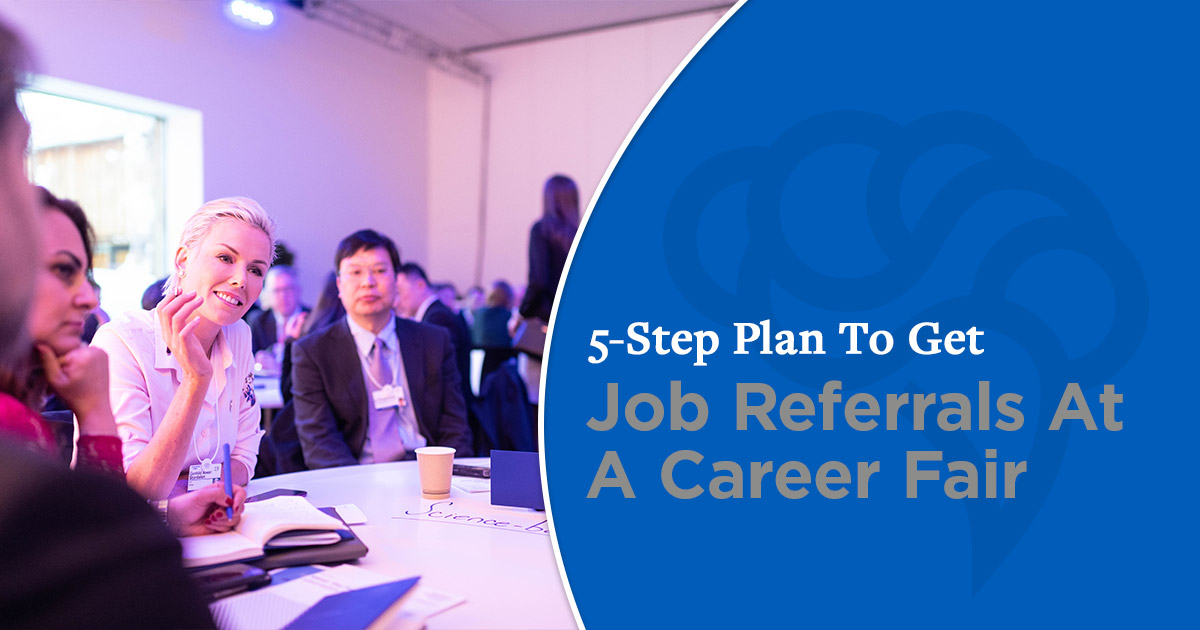5-Step Plan To Get Job Referrals At A Career Fair

I have attended many career fairs and networking events in the past.
And, each one was a struggle.
I know that networking with industry professionals is an essential part of transitioning out of academia.
But, I couldn’t figure it out.
The same thing seemed to happen at every event.
I felt awkward, I struggled to talk about myself, and I didn’t know how to start or end conversations.
Basically, it was a disaster.
I wanted to give up, return to the lab, and just work by myself where I was comfortable.
But, the lab’s money was running out and I had no idea how much longer I would even have my postdoc.
Unemployment was looming over me.
I couldn’t give up. I had to keep trying.
So, I took a step back.
I decided to approach the situation like the PhD I am — methodically and strategically.
If I had to go to these networking events, I needed a solid protocol.
A protocol that I could follow over and over again and consistently get the results I wanted — to get referrals and to get job offers.
So, I took what I had already learned from my few terrible career fair experiences and I wrote a protocol.
After a few more test runs, I had it down.
I knew what I needed to do to successfully network at a career fair to make the event worth both my time and money.
And, it wasn’t long until I landed my first industry position.
Why Career Fairs Are Not A Waste Of Time

The career fair has a pretty bad reputation.
Candidates who attend them often complain about how busy the career fair is, how awkward the conversations are, or that no one ever gets hired from job fairs.
If you are one of these people, you are going into the career fair with the wrong attitude and the wrong strategy.
If no one ever gets hired from career fairs, then why did Amazon, one of the world’s most successful companies, hold its own job fair last year to recruit candidates for thousands of open positions?
Because, the career fair is not dead and it is not a waste of time — you have just been doing it wrong.
According to Glassdoor, 75% of employers attend career fairs held at universities.
These career fairs provide an opportunity for job candidates and employers to get valuable face-to-face interactions that they might not have had otherwise.
It can be difficult to connect with potential employers face-to-face outside of these events.
But, this in-person contact is very valuable.
According to Harvard Business Review, a request made in person is 34 times more successful than one made via email.
34 times more successful!
The mere opportunity to speak face-to-face with your target company at a career fair improves your chances of getting hired.
But, you have to know how to make the most of these career fair events.
5-Step Plan For PhDs To Get Referrals At A Career Fair
Employers want to find the best candidates.
But, at a career fair, your time to prove that you are the best candidate is limited.
You must be prepared.
You must have a strategy.
Here is a 5-step plan that will help you get referrals at a career fair…
1. Prepare the basics: resume, business cards, etc.
The first thing to do well before you attend a career fair, or industry expo, is get your basic necessities in order.
This means perfecting a general resume and creating business cards.
For a career fair, it is a good idea to create a 1-page resume.
You may even want to have a couple of versions of this resume that correspond to the types of positions that you are interested in.
Make sure it is an industry-style resume with results-oriented bullet points that demonstrates to employers that you are ready to make the transition out of academia.
Print off several copies of each resume to bring with you.
Also, order some professional business cards.
On your business cards, do not use the logo of your university or your university email address.
You want to present yourself as an industry professional, not as an academic, so create a professional email address and use that.
Some career fairs, or the organizations that run the career fair, have online webinars before the event for attendees to watch.
If these exist, make sure you attend them and learn as much as you can.
As the day of the event draws nearer, make sure you gather the other practical items you need.
Bring with you a notebook, pens, water, mints and on the day of the event dress professionally, in business attire.
2. Prepare specifics: attendee and company research.

In addition to preparing the basic items, you must research the companies who will be at the career fair before you attend.
Whether there are going to be 20 or 200 employers at the fair, spend time researching each company on the list.
Don’t skip over a company that’s on the list just because you don’t know it.
Look on each company’s career website to see if they have any jobs you are interested in.
You might find a great company you hadn’t heard of before with an open position that fits what you are looking for.
Before the event, narrow down a list of about 10 targets, so that you can focus your preparations.
From those 10 companies, print out the job descriptions you are interested in.
Also research the culture of those companies you are interested in, and take note of their values, mission, and products.
Think about how your skills would be a good fit for the company, and the position you are interested in, and be ready to talk about this.
Finally, map the location of the company booths in the expo and know where you want to go.
Have a plan, but be flexible.
If a particular booth is busy, move on and come back later.
3. Prepare to talk about yourself: elevator pitch.
A career fair is a unique networking opportunity.
Unlike other networking events, at a career fair, you can hand over a copy of your resume and talk about a job you are interested in during a first interaction.
But, you still need to be prepared to have a good conversation.
Prepare intelligent questions based on what you learned about the company from their website, from informational interviews, from their quarterly reports, etc.
But, you also need to be prepared to answer common questions about yourself.
Questions such as:
Tell me about yourself?
What can you do for us?
What do you want to do?
What makes you unique?
Most of this boils down to having a great elevator pitch.
Your elevator pitch is a few short sentences, a hook, about yourself.
And, at a career fair, you can tailor this pitch toward the positions that you are interested in and why you might be a good fit for those positions.
For example, you could mention the important technical and transferable skills that you have, talk about how you would be able to help the team, or mention what functions you are looking for in your next role.
Have your elevator pitch and answers to these common questions prepared, but always go with the flow of the conversation.
Don’t forcefully start talking about yourself, or asking for a job if it does not come up in conversation naturally.
4. Network a lot, even though it’s hard: target your connections.

Once you have prepared for the career fair, it’s time to execute.
Don’t waste the energy you put into preparing by not performing well at the event.
Go in with the right mindset.
Be confident, keep good eye-contact, have a firm handshake, smile, and be enthusiastic.
Visit your target companies and speak with the people at the booth.
Use your elevator pitch.
But, always be willing to talk about other things, too.
It’s also okay to ask to speak with other people, or to ask if there is someone else within the company, who you should talk to about the position you are interested in.
Simply ask, “Do you know who I can talk to in order to get information about X?”
And, when conversations feel awkward or you aren’t sure what to say, ask the other person questions.
Ask them about their role.
Ask them what they like about the company.
Ask them how they came into their current position.
These questions will get the other person talking and make things more comfortable.
It’s also a great way to learn more about the company.
When the conversation is over, always ask what you need to do next, or what the next steps are.
Always collect contact information for the people you have spoken with.
And, after you visit a booth, take a few moments to write down some notes from the interaction you had.
This way, you can create a solid follow-up plan.
5. Be sure to follow up: connecting only is not networking.
The last part of attending any networking event is the follow-up.
This is actually the most important part of networking.
Initiate your first follow-up the afternoon or evening right after the event.
Use the notes that you took after you left the booth to make your follow-up message more personal.
Another great way to follow up is to send a handwritten thank-you note.
It takes a bit more effort to find out where to send the note, but this can set you apart from other candidates.
This initial follow-up is just the beginning of your follow-up strategy.
To build a professional relationship that can go beyond the first meeting you had at the career fair, you will need to find a way to consistently add value to your new connection.
Attending a career fair has the potential to be a great boost to your job search. But, you have to do it right. You need to know the best way to take advantage of a career fair. This means preparing the basics (like a resume), preparing for the specifics of the event, preparing your elevator pitch, networking, and following up. As a PhD, you are in the position to transition into the industry role you want. But, you must learn the power of networking and use it to facilitate your transition.
If you’re ready to start your transition into industry, you can apply to book a free Transition Call with our founder Isaiah Hankel, PhD or one of our Transition Specialists. Apply to book a Transition Call here.

ABOUT ADITYA SHARMA, PHD
Aditya Sharma, PhD, earned his advanced degree at the University of Toronto, Canada. Now, he combines his passion for all things STEM with keen business acumen, and he works as a scientific consultant at a top Canadian consulting firm.
































